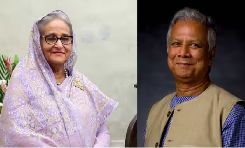Days after Sheikh Hasina resigned as the Prime Minister of Bangladesh, the opposition Bangladesh Nationalist Party (BNP) and Jamaat-e-Islami are set to form an interim government which will work on the aid and advice of the social entrepreneur, banker, economist and civil society leader Muhammad Yunus. The former MD of the Grameen Bank has reportedly agreed to head the interim government. Muhammad Yunus will serve as the chief adviser of the interim government, according to a press release from Bangabhaban yesterday. The decision followed a meeting on the formation of the interim government between key organizers of the anti-discriminatory movement and President Mohammed Shahabuddin. The heads of the three armed forces also attended the meeting.
Meanwhile, it has been decided that the national elections will be held in Bangladesh after three months, once the situation returns to normal in the protest-hit nation. It’s not clear whether Hasina’s Awami League will participate in the polls or get banned by the interim government. Since Hasina is likely to retire, it will be important to see who will head the Awami League after her.
Meanwhile, the BNP will be holding a show of strength rally today in which former PM and party chief Khaleda Zia’s son Tarique Rahman, who is also the vice chairman of the BNP, will take part in the rally.
Since the Hasina government banned the Jamaat-e-Islami in 2013, the Islamic party is likely to see its status restored and may participate in the upcoming general elections. The Jamaat-e-Islami, founded in 1975, is one of the largest Islamist parties in the country. It has previously formed alliances with the BNP.
Meanwhile, the unrest continues in Bangladesh with radical Islamic protestors not only attacking the Hindu minorities but also destroying the government properties. Those affected by violence are gathering near the India-Bangladesh border to enter Indian territory. The Border Security Force is on high alert and has been ordered to let people in only after thorough verification of the documents.
Bangladesh is facing a fluid political situation with Sheikh Hasina, on August 5, tendering her resignation from her post in the wake of mounting protests. The protests, led majorly by students demanding an end to a quota system for government jobs, took the shape of anti-government protests.


